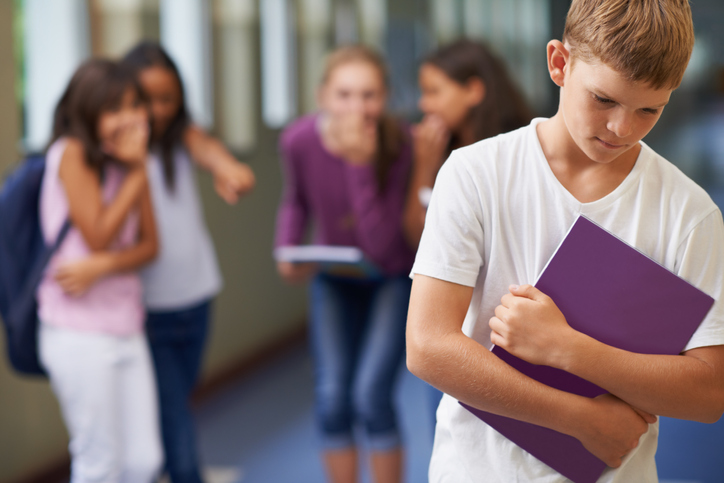Bullying
Bullying is when someone keeps doing something to you on purpose that hurts or upsets you. Bullying is still bullying even if it happens behind your back, if it is not physical or if it’s done by one person or a group.
This content has been written for children and young people. If you’re looking for information for over 18s, visit our Types of Crime information about harassment.
Bullying may be:
- physical (hitting you)
- emotional (spreading hurtful rumours)
- verbal (calling you names), or
- bullying within your social group (leaving you out of things).

Bullying is not your fault and nobody has the right to bully you. People can be bullied for all sorts of reasons, or for no particular reason at all; it can happen to anybody at any time.
Bullying is still bullying even if it’s behind your back, not physical or only done by one person. Bullying can take place anywhere. It may be in your home, at school, in the park or in your local youth club. It could be by one person, a group of people or a gang, or even your friends.
Bullying can happen in lots of different ways, including:
- verbally – name calling, threatening, whispering behind your back, spreading rumours
- physically – pushing, hitting, kicking (assault)
- being ignored or left out
- having your things stolen (theft) or damaged (criminal damage)
- getting unkind or threatening texts or emails
- being made to do something you don’t want to do.
Bullying can also include antisocial behaviour, or hate crime – when you are targeted by bullies for who you are, for example because of your race, religion, gender identity, disability or sexualilty.
Cyber bullying – the name used to describe what happens if you are bullied online, through social networks, chat forums, emails or instant messaging – is also becoming a bigger problem.
Sometimes bullying is so serious that you may want to think about telling the police. For example, if you’re injured, something of value has been stolen or if you’ve been seriously threatened.
Bullying itself isn’t a crime, but many of the things that bullies do, or the ways they try to bully people, are against the law. These include:
- actual bodily harm: attacking someone to cause them a visible but minor injury
- blackmail: trying to get money by intimidating someone
- common assault: attacking someone to cause a minor injury, or threatening to attack someone
- criminal damage: destroying or damaging something, whether on purpose or through reckless behaviour
- grievous bodily harm: deliberately attacking someone to seriously injure them
- harassment: threatening or insulting someone a lot so that they become scared or upset
- possession of a weapon: carrying around something that could cause an injury to someone
- robbery: using or threatening violence to steal something from another person
- theft: stealing something from someone without them knowing.
Being bullied can make you feel upset, worried, sad or angry, and it may feel like you’re trying to deal with this all on your own. If you have fallen out with your friends or you feel that your friends are bullying you, remember that it doesn’t have to be like this forever. Things can get better. Lots of young people find that talking to someone can really help.
- Tell an adult you trust. This could be a teacher, a family member, your youth worker or support worker. Tell them what is going on and ask for their help and advice.
- Talk to your support worker, youth worker or the adult you trust about putting together a safety plan. This can include things like finding ways to stay safe at school, travelling to and from school safely, and where you can go or who you can talk to whenever you feel afraid or threatened.
- Most schools or youth organisations will have an anti-bullying policy, which means that they have a plan of what to do and how they can help you. They will probably have dealt with this many times before.
- Your school, youth worker or support worker will also be able to give you some practical advice on dealing with bullying. This might include taking positive action by learning how to be more assertive and how to control situations, learning to ignore comments or teasing (bullies will always look for a reaction), and understanding that fighting back, or fighting to keep possessions, can often make the situation worse or put you at greater risk.
- Talk to your friends. A good friend will listen to you and may help you speak to an adult.
Victim Support’s Children and Young People Services – you can contact your nearest Victim Support office, call the 24/7 Supportline, contact us via live chat, or if you are 16 or older, you can create a My Support Space account. This is a free, safe and secure online space where you can work through interactive guides to help you move forward after crime.
Childline – 24-hour support for young people, both on the phone and through online chats and message boards, on bullying and a range of other issues: 0800 1111.
Kidscape – online advice for young people as well as parents and carers, focusing on preventing bullying and protecting children from abuse.
The Mix – information and support for under 25s on a whole range of issues, including bullying, cyberbullying, and how to build safe and supportive friendship groups. Get confidential help by email, text, webchat or phone: 0808 808 4994.
